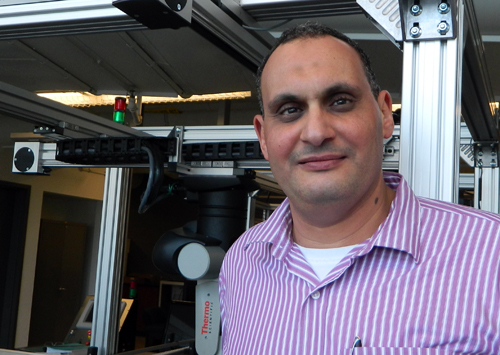
In the search for more sustainable and environmentally-friendly production, every part of the process needs to be examined. Mechanical engineering professor Ibrahim Deiab is studying, among other topics, how machining processes can be cooled and lubricated more effectively and with less impact on the environment.
Currently, machining processes are usually cooled by flooding the hot areas with a mixture of synthetic oil and water. The synthetic oils are difficult to recycle and large quantities need to be used each time, with consequences for the environment. “You basically have to throw it away after using it,” says Deiab. The water in the mixture may cause exposed metal to rust, and exposure to the synthetic oils is linked to health concerns for those who work with them.
Deiab’s research is looking at changing the cooling process in two ways. First, his experiments use vegetable oils, which are easier to recycle and less likely to cause health issues. Second, instead of flooding the machines with oil, he sprays or mists them.
“This approach is not without its problems,” Deiab acknowledges. “The sprayed-on oils absorb less heat, and because of the high pressure used can penetrate into the machine’s controls and create electrical short circuits.” His research is focused on making the vegetable oil spray a more effective technique that will also help protect the environment.
Deiab, who was born in Egypt but grew up in Kuwait, says he was drawn to mechanical engineering because of his interest in mathematics and design. After completing his undergraduate work and master’s at Kuwait University, he did his PhD at McMaster University and taught there for a couple of years. He returned to the Middle East in 2007 to teach and do research at the American University of Sharjah in the United Arab Emirates.
Despite having lived in Canada for several years, Deiab recalls a stark reminder of the difference in climate between the two countries when he accepted a position at U of G earlier this year.
“The temperature when I left Dubai in January was 30 degrees Celsius. When I arrived in Ontario, the temperature was minus 30 degrees,” he recalls. But Deiab doesn’t regret the move. “My interest in sustainability and environmentally-friendly systems is very much in line with U of G’s strategic research plan,” he says.
Deiab tackles sustainability in other areas as well, including increasing the efficiency of machining titanium, a hard metal often used in the aerospace industry because it is durable and can withstand high temperatures. However, the qualities that make titanium so desirable in these applications also make it very difficult to cut.
“The knife edge or tool you are using to cut the titanium wears out very quickly,” says Deiab, “and the metal stays very hot – hot enough to melt the tools – so you need special coolants, and the process is very slow.” Deiab’s work involves developing coatings for the cutting tools to make them harder and more heat-resistant, and setting the cutting parameters of depth and speed for greater efficiency.
Anything that makes a machine process more efficient helps the environment, he points out. Deiab is also interested in the development of hybrid machines that can complete more than one process, such as milling and grinding. “This not only saves energy, it saves time,” he adds.
Deiab and his wife, a librarian, have two teenage children. When he is not analyzing industrial machinery, he likes to play basketball and read – not the technical books that take up his working hours, but books about history and the suspenseful novels of Dan Brown.